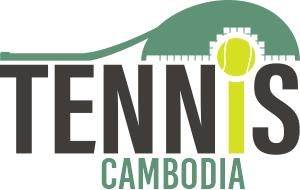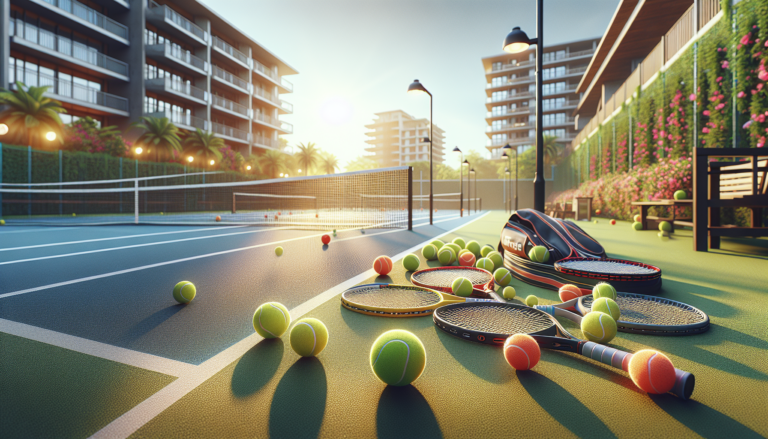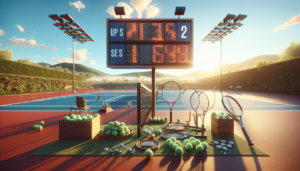As summer approaches, tennis enthusiasts of all ages and skill levels seek opportunities to improve their game and enjoy the sport in a focused, supportive environment. Tennis camps provide the perfect solution, offering intensive training programs led by experienced coaches at top-notch facilities across the country. Whether you’re a beginner looking to learn the fundamentals or an advanced player aiming to take your skills to the next level, there’s a tennis camp that can help you achieve your goals.
Tennis camps are available for both youth and adults, with programs tailored to specific age groups and skill levels. From day camps to overnight camps, there are options to fit every schedule and budget. Many camps also offer specialized training in areas like mental performance, injury prevention, and tournament preparation, ensuring a well-rounded experience that goes beyond just hitting balls on the court.
Introduction to Tennis Camps
What Are Tennis Camps?
Tennis camps are intensive training programs designed to help players of all ages and skill levels improve their game in a focused, immersive environment. These camps typically range from a few days to several weeks in length and are held at tennis facilities, universities, and resorts across the country. Campers receive personalized instruction from experienced coaches, participate in drills and match play, and have access to top-notch tennis facilities and equipment.
Tennis camps offer a unique opportunity for players to dedicate themselves fully to the sport, free from the distractions of daily life. The immersive nature of these programs allows for rapid skill development and a deep dive into the technical, tactical, physical, and mental aspects of the game. Campers also benefit from being surrounded by other passionate tennis players, creating a supportive and motivating atmosphere that can lead to lasting friendships and a lifelong love of the sport.
Types of Tennis Camps
Tennis camps come in many different formats to cater to the diverse needs and goals of players. Youth tennis camps are designed for players typically aged 8-18 and offer age-appropriate instruction and activities to help young athletes develop their skills and passion for the game. These camps often include a mix of on-court training, fitness and conditioning, and fun off-court activities like swimming and team-building games.
For adult players, tennis camps provide an opportunity to focus on their game and receive high-level coaching in a supportive, social environment. Adult tennis camps may be skill-level specific, such as beginner or advanced, or they may cater to specific groups like women, seniors, or doubles teams. Many adult camps also offer off-court seminars on topics like nutrition, injury prevention, and mental performance to provide a comprehensive learning experience.
Both youth and adult tennis camps may be day camps or overnight camps. Day camps allow local players to commute to the camp facility each day for training, while overnight camps provide an immersive experience where players stay in dorms or lodgings on-site. Overnight camps often include additional activities and bonding experiences that enhance the overall camp experience.
Benefits of Attending Tennis Camps
Skill Improvement
The primary benefit of attending a tennis camp is the opportunity for focused, intensive training that leads to rapid skill development. With daily on-court sessions led by expert coaches, players can make significant strides in their technical, tactical, and mental game. Coaches provide personalized feedback and instruction, helping players identify and correct weaknesses while building on their strengths.
In addition to group drills and exercises, many tennis camps offer private or semi-private lessons for even more individualized attention. This allows players to work on specific areas of their game and receive detailed guidance from coaches. Video analysis and other technological tools may also be used to help players see their strokes and movements from a new perspective and make necessary adjustments.
Personal Development
Beyond the technical skills learned on the court, tennis camps also provide valuable opportunities for personal development. Campers learn important life skills like sportsmanship, teamwork, resilience, and discipline. They must learn to manage their time effectively, balance training with rest and recovery, and communicate with coaches and fellow campers.
For many players, especially youth, tennis camp may be their first experience spending an extended time away from home. This can help foster independence, self-reliance, and adaptability. Campers also have the chance to make new friends who share their passion for tennis, creating a sense of community and belonging that can last long after the camp ends.
Health and Fitness
The intense physical demands of a tennis camp can lead to significant improvements in overall health and fitness. Daily on-court training, combined with fitness and conditioning sessions, helps players build endurance, strength, speed, and agility. Many camps also offer nutritional education and provide healthy meals to support optimal performance and recovery.
In addition to the physical benefits, tennis camps can also boost mental health and wellbeing. The immersive, focused nature of camp can provide a much-needed break from the stresses and distractions of daily life, allowing players to recharge and reconnect with their love of the game. The positive, supportive environment of camp can also boost self-esteem and confidence.
Tennis Camp Programs and Activities
Training Sessions
The core of any tennis camp is the on-court training sessions. These sessions are typically led by experienced coaches and include a mix of drills, exercises, and match play designed to help players improve all aspects of their game. Technical training focuses on stroke mechanics, footwork, and shot selection, while tactical training emphasizes strategies for singles and doubles play, including shot patterns, court positioning, and decision-making.
| Aspect of Game | Key Training Elements |
|---|---|
| Technical |
|
| Tactical |
|
| Physical |
|
| Mental |
|
Many camps also include physical conditioning sessions to help players build the endurance, strength, speed, and agility needed to perform their best on court. Mental training, including visualization techniques and strategies for maintaining focus and emotional control, rounds out the comprehensive training approach found at top tennis camps.
Competition Opportunities
In addition to training sessions, most tennis camps also provide opportunities for players to test their skills in competition. This may include camp-wide tournaments, inter-camp matches with nearby programs, or even entry into local USTA tournaments. These competitive experiences give players the chance to apply what they’ve learned in a real match setting and to benchmark their progress.
Competition also helps campers learn valuable lessons in sportsmanship, resilience, and managing nerves and pressure. With the support and guidance of coaches, players can use these experiences to identify areas for further improvement and to set new goals for their tennis journey.
Specialized Training
Many tennis camps offer specialized training options to help players take their game to the next level. These may include intensive training for tournament players, speed and agility training, mental performance coaching, or sessions focused on specific shots or game styles. Specialized training allows players to zoom in on key areas and to receive advanced coaching.
Some camps also bring in guest coaches or speakers to provide unique perspectives and expertise. These may include current or former pro players, renowned coaches, or experts in areas like sports psychology or injury prevention. Exposure to these high-level insights can be incredibly motivating and illuminating for campers.
Top Tennis Camp Locations
Nike Tennis Camps
Nike Tennis Camps are offered at over 100 locations across the United States. Held at colleges, tennis clubs, and resorts, these camps provide top-notch instruction for players of all levels. Nike camps are known for their expert coaches, many of whom have played or coached at the professional or collegiate level.
With day and overnight options, as well as camps focused on specific age groups or skill levels, Nike offers a wide variety of camp experiences. Some top locations include:
- Amherst College Tennis Camp – Amherst, MA
- Stanford University Nike Tennis Camps – Stanford, CA
- Saddlebrook Resort Tennis Program – Wesley Chapel, FL
- University of Virginia Nike Tennis Camp – Charlottesville, VA
IMG Academy
Located in Bradenton, Florida, IMG Academy is a world-renowned multi-sport training facility that offers year-round tennis camps for players aged 8-18. IMG’s tennis program is led by expert coaches and focuses on technical, tactical, physical, and mental skill development. With state-of-the-art facilities, including 35 outdoor hard courts and 16 clay courts, IMG provides an unparalleled training environment.
In addition to summer and holiday camp options, IMG offers a full-time tennis academy for players seeking an immersive, long-term training experience. Notable alumni of IMG’s tennis program include Andre Agassi, Maria Sharapova, and Kei Nishikori.
USTA Pre-Event Camp
The United States Tennis Association (USTA) offers a specialized 3-day pre-event camp at sites hosting on-campus tournaments. Designed for players aged 10 and above, these camps focus on tournament preparation and match play strategy. Participants receive coaching and guidance from USTA National Coaches.
USTA Pre-Event Camps are a unique opportunity for tournament players to gain a competitive edge and to make the most of their tournament experience. Camps are held in conjunction with events like the National Clay Court Championships and the National Championships.
Choosing the Right Tennis Camp
Factors to Consider
With so many tennis camp options available, it’s important to take the time to find the program that best fits your needs and goals. Some key factors to consider include:
- Skill level – Look for a camp that caters to your current skill level and offers appropriate challenge and growth opportunities.
- Training focus – Consider your training goals and choose a camp that emphasizes the areas you wish to improve, such as technique, tactics, or mental game.
- Coaching staff – Research the qualifications and experience of the coaching staff to ensure you’ll receive high-quality instruction and guidance.
- Camp format – Decide whether a day camp or overnight camp is the best fit for your schedule and preferences.
- Location – Consider travel time and costs, as well as the camp’s facilities and amenities.
- Camp duration – Think about how much time you can dedicate to camp and what length will allow you to make meaningful progress.
Customizable Programs
Many tennis camps offer customizable programs to meet the specific needs and goals of each player. This may include the ability to select specific training sessions, to request private lessons, or to tailor the camp schedule around other summer activities or commitments.
Some camps also offer the option to extend one’s stay or to participate in multiple sessions throughout the summer for players looking for a longer, more immersive training experience. This flexibility allows players to create a personalized camp experience that maximizes their time and investment.
Conclusion
Tennis camps offer a fun, focused way to accelerate your skills and build lasting tennis relationships over the summer. With options for all ages, skill levels, and schedules, there’s a camp program that can help every player take their game to the next level. The benefits of camp extend beyond the court, with opportunities for personal growth, improved fitness, and lifelong memories.
When choosing a tennis camp, take the time to research and compare programs to find the best fit for your goals and needs. Consider factors like the coaching staff, training facilities, camp format and duration, and location. Don’t hesitate to reach out to camp directors with questions or to request references from past participants.
Whether you’re a beginning junior player or a seasoned adult competitor, investing in your game with a tennis camp experience can pay dividends both on and off the court. You’ll walk away not only with improved strokes and strategy, but with increased confidence, resilience, and passion for the lifetime sport of tennis.






